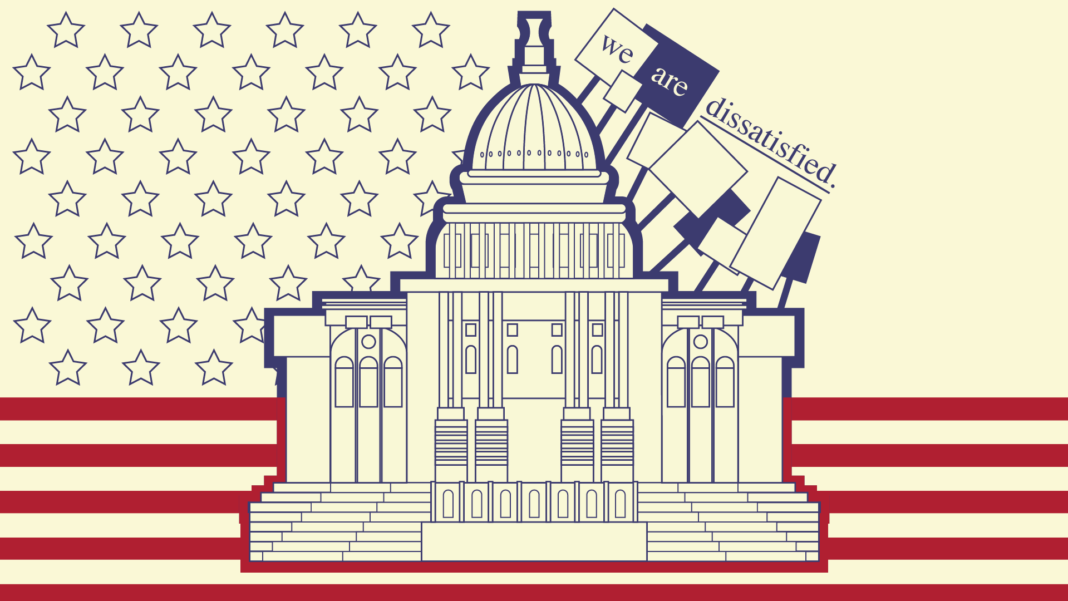With the 2024 presidential election less than 10 months away, public trust in the government is nearing historic lows. In a survey done by Pew Research Center, about 20% of Americans say they trust the government to do what is right. It has been almost seven decades since trust has reached these levels.
Pair this with the American political divide that the Pew Research Center calls “exceptional in its nature” and which Axios reports as only getting deeper, it’s easy to worry about the future of our country. Especially as the last two presidents have had trouble fulfilling their campaign promises.
In former President Donald Trump’s case, most of his main promises fell by the wayside. He failed to lock up Hillary Clinton as he promised his supporters and never left NATO. His vow to build a border wall failed miserably, as he struggled to obtain funding from Congress.
Trump’s attempt to repeal and replace Obamacare sputtered out on Capitol Hill as well, despite the GOP’s control of both chambers for the first half of his term.
President Biden has also had a disappointing presidency. He promised to overhaul immigration policy, and what little he’s done has led to an awful border crisis. Opposition in Congress has stalled efforts to address gun violence, student loans, paid leave and the minimum wage.
On foreign policy, he fulfilled his vow to strengthen U.S. relations with NATO and pulled out of Afghanistan, but the withdrawal was chaotic and led to the deaths of hundreds, including 15 U.S. service members. Instead of the safer world he promised, the U.S. is now involved in two brutal international conflicts in Gaza and Ukraine.
This is a roundabout way to say that Americans are valid in their concerns about our government. Our last two presidents have struggled to deliver on many of their biggest promises and have had even less success reaching over the aisle and making deals with the other party.
Many of Biden and Trump’s failures can be attributed to the deep ideological divide within Congress. The Pew Research Center found that Congress is more ideologically divided than it has been over the past 50 years. Republicans and Democrats have been moving away from the ideological center since the 1970s and now a little over 10 moderate Democrats and Republicans hold seats in Congress. Because of this, it is very difficult for either party to pass any impactful legislation they have advertised like replacing Obamacare or overhauling immigration.
While this may be frustrating, the government is actually functioning the way that it was intended to.
As the Heritage Foundation wrote, “the Framers (of the Constitution) tried again, creating a system of government that did not deny the pursuit of self-interest, but instead helped to direct it toward compromise and consensus.”
One of the main goals of the Constitution was to promote compromise and only allow major change when a majority agreed. In doing this, they added both the separation of powers and checks and balances to the Constitution. These additions not only prevent one section or party in the government from gaining too much power but also make it difficult for our government to function when it is divided.
Because power is diversified throughout the government and each body has a check on the other, one party rarely gains complete power in the government. This means compromise is needed to create any major change within the country, and compromise is almost impossible with the current division in our government.
The government’s current lack of major action is just the government functioning as it should. The founding fathers had a vision for a country that only changes when a majority agrees and compromise can be reached. They also feared rapid, harmful change that more authoritarian regimes could pull off.
Our government isn’t making great progress for a reason, and that reason is an important one.
Ethan Mannello is a junior majoring in journalism with minors in political science and finance.







